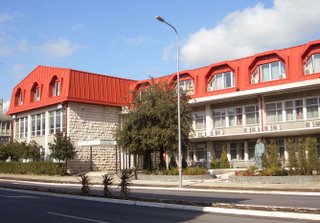 Where I spend my time: I’ve spent most of my time so far at the Faculty of Law--to the right. In Eastern Europe the word faculty is equivalent to college. The Faculty of Law consists not only of the law program—it is strictly an undergraduate degree program—but also the political science, social work, and journalism programs. The journalism program is in its fourth year. Prior to the program’s founding, some law school grads became journalists. Some journalists have also been educated outside of Montenegro. I met a young woman journalist a couple of years ago who was a mechanical engineering graduate. I asked her about her qualifications for her newspaper reporter job. She replied, “I hadn’t been able to find work as an engineer and I needed a job. My aunt worked here and helped me get hired.”
Where I spend my time: I’ve spent most of my time so far at the Faculty of Law--to the right. In Eastern Europe the word faculty is equivalent to college. The Faculty of Law consists not only of the law program—it is strictly an undergraduate degree program—but also the political science, social work, and journalism programs. The journalism program is in its fourth year. Prior to the program’s founding, some law school grads became journalists. Some journalists have also been educated outside of Montenegro. I met a young woman journalist a couple of years ago who was a mechanical engineering graduate. I asked her about her qualifications for her newspaper reporter job. She replied, “I hadn’t been able to find work as an engineer and I needed a job. My aunt worked here and helped me get hired.” I won’t say that she wasn’t or couldn’t become a good reporter. (She interviewed me for a story and my local contact seemed generally pleased with the story.) Being a reporter for print or broadcast involves gathering, evaluating and conveying information. The evaluation and conveyance stages are the most difficult. The challenge is to have sufficient education and curiosity to be able to understand and evaluate the information you gather. And, strong language and written skills to report the news. Evaluation also means having an open point of view that isn’t tied to a political party or partisan cause. And, that’s one of the primary challenges facing journalists in Montenegro. Many of their media firms are owned by or allied with political parties, or owners with specific business interests. You may have an open mind but it isn’t always welcomed on the job.
Just as in the United States, journalists occupy a visible position in the community and as in the U.S., Montenegrin journalists are often young and poorly paid. As many as one-third of media employees in Montenegro at parttime workers.
How does a free press fit into a transitioning country? Experts generally say that having a democracy depends on three things: the ability to hold competitive political elections, political participation by the citizens, and political and civil liberties. It is within this last area—political and civil liberties—that we see the importance not only of free speech but also free press, both print and broadcast.
I fear this entry is getting a little long; I’ll talk in my next entry about journalism and media training and my work in this area.
No comments:
Post a Comment